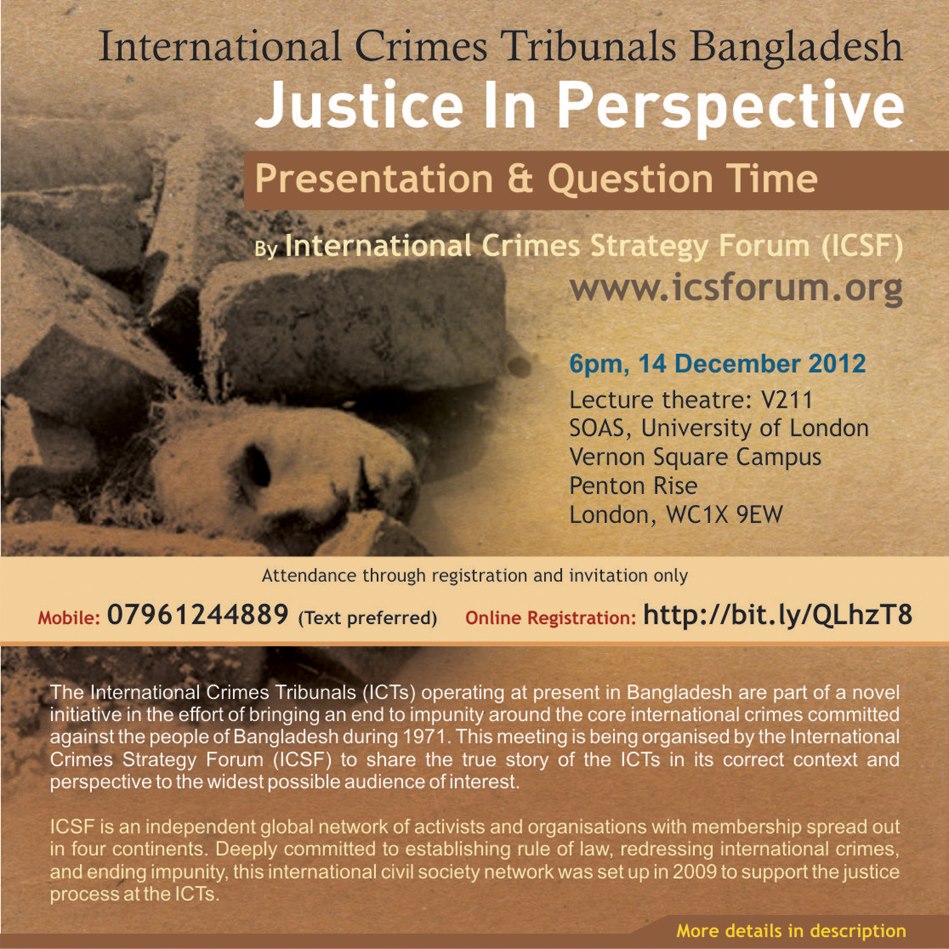Justice in Perspective: Presentation and Question Time

A discussion and presentation programme titled “International Crimes Tribunals Bangladesh: Justice In Perspective” took place on 14 December 2012 in SOAS, University of London (Lecture Theatre V211, Vernon Square Campus). The programme was organised by International Crimes Strategic Forum (ICSF), a coalition/network of activists, groups and organisations, all of which have been campaigning relentlessly for the trial of those who committed atrocities and crimes against humanity during the independence war of Bangladesh in 1971. The programme primarily focused on the running justice process set up in 2010 to try alleged criminals accused of committing crimes against humanity, war crimes and other international and humanitarian crimes. The programme was divided into two parts : a presentation outlining different aspects of the justice process and the historical background and a Q & A session aimed at dispelling confusions and providing clarifications in relation to the on-going justice process as well as giving the audience a greater opportunity to appreciate and engage in the issues addressed in the Presentation segment. It should be noted here that, a tribunal titled ‘International Crimes Tribunal’, Bangladesh (ICT) was established in 2010 consisting of three judges to try the alleged offenders and perpetrators under the statute titled ‘International Crimes (Tribunal) Act 1973’ which went through some amendments and modifications since the Tribunal was set up and a further tribunal was established in 2012 to facilitate the justice process more expeditiously and effectively.
The programme started at 6:30 pm sharp. The presence of media was significant as was the general level of attendance. The theatre was filled to its capacity proving great interest in this justice process. The evening began with a welcoming speech by Rana Yasmin in which she briefly explained why the programme was taking place and what it sought to achieve. It was followed by a video documentary giving the audience an opportunity to appreciate the history behind the need for the justice process against the perpetrators and highlighting the need for an end to the culture of impunity. Dr Nowrin Tamanna, activist member of ICSF and an academic, then gave a presentation speech titled: “1971: Perpetrators, Victims, Motives, and Crimes” detailing the context in which the justice process today stands. This was followed by another presentation titled ‘Four decades of campaign for justice’ and was delivered by Nora Sharif, a long-time campaigner for the justice process. This presentation was aimed at conveying the parable of struggles that accompanied the demand for justice against the perpetrators. Saikat Acharjee, a practising solicitor, took over the presentation and went on to give an account of framework of the Justice Process at the ICT underlining the nature of powers and work of the tribunals and the fundamental legal principles and jurisprudential tenets on which the tribunals and the governing laws were shaped. Arifur Rahman, activist member of ICSF followed Acharjee’s speech with a narrative that sought to demonstrate the alignments and roles of the parties involved in the justice process, the political cost of the process, and how best the interest of justice could be served in relation to this particular justice process.
A question and answer (Q&A) session, moderated by Nora Sharif, ensued which was lively, informative and helpful for those attended. At the beginning of the Q&A session, Rayhan Rashid read out the official statement issued by ICSF on the recent incident involving illegal interception of Justice Nizamul Huq’s (the former ICT-1 Chairman) private communications. Through the statement, ICSF called on the Government of Bangladesh seeking a full inquiry to the incident, assuring to provide complete assistance to the authorities in both Bangladesh and UK.
After the Q & A session, Showgatul Alam, Barrister and a campaigner for justice for crimes in 1971, concluded the programme by urging everyone to stand united in the demand for an end to the culture of impunity and to bring the criminals to justice. The programme came to an end at 8:30 pm.
